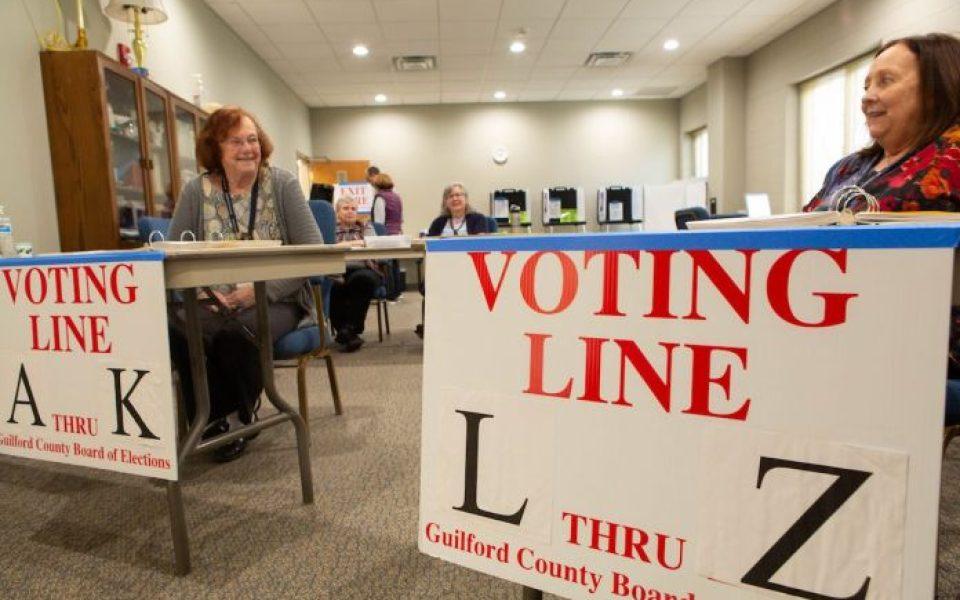State and local board of election officials work on
contingency plans for the November election in light of COVID-19.
Directors for both the Forsyth and Guilford county boards of
elections say that they are working on contingency plans for the November
general election given concerns brought on by COVID-19.
As several states push back their primary dates across the
country, local election boards are also weighing their options for November if
the coronavirus persists past the summer.
“There’s a side that says maybe we’re okay by then, and
that’s great, but even under that circumstance, I’m greatly increasing the
budget for the mail-in process,” said Charlie Collicutt, the elections director
for Guilford County. “I think voters are going to want to take advantage of
that more than ever.”
Tim Tsujii, Collicutt’s counterpart in Forsyth County, has
been thinking along the same lines.
“I know there are rumblings of an all-by-mail for November,” Tsujii said. “If that were to happen, that would require legislative action to permit that… We’ve never really encountered this situation before.”
North Carolina allows registered voters to request and receive a mail-in absentee ballot, with no special circumstance or reasoning needed. According to Pat Gannon, the state board of elections’ public information officer, only about 4 percent of voters choose this option during elections. Numbers from the state’s 2016 election voter turnout show that 4.2 percent of voters opted for mail-in ballots for the presidential race. Because of this, Gannon said that moving to an all-mail-in system for the 2020 general election is highly unlikely.
“We’ve learned from other states that have gone to all-mail-in balloting, that it’s a process that takes years to implement,” Gannon said in a phone call on Friday. “To try to do that in a span of a few months in North Carolina would be irresponsible.”
Karen Brinson Bell, executive director of the state Board of Election, said moving to an all-mail-in system would be nearly impossible for North Carolina.
“Voting for the November election actually begins in September and the bulk of preparations and training take place in July and August,” Bell said in a written statement provided to Triad City Beat. “This means we only have a little more than three months to make legislative changes and modify our processes and materials. For these reasons, we are focusing on improving and strengthening both no-excuse absentee by mail voting and in-person voting.”
In a March 26 letter to Gov. Roy Cooper and other state legislators, Bell listed a number of recommendations her office has put together as a response to COVID-19. The first item on the list includes rescheduling the Republican second primary for the 11th Congressional District from May 12 to June 23. Other items include establishing an online portal to request absentee ballots, establishing a fund to pay for postage so voters can easily return their absentee ballots, making Election Day a state holiday, and increasing pay for pollworkers.
According to an article on Wednesday by The Hill, as part of the upcoming coronavirus funding package, “$400 million would be made available to states to ‘help prepare for the 2020 election cycle, including to increase the ability to vote by mail, expand early voting and online registration, and increase the safety of voting in-person by providing additional voting facilities and more poll workers.’”
One concern with the anticipated increase in mail-in ballots is the potential for increased voter fraud.
The November 2018 election in the state’s 9th Congressional District between Republican Mark Harris and Democrat Dan McCready revealed the extent to which absentee ballots could be used to sway an election. An investigation by the state Board of Elections found that an operative hired by Harris’s campaign paid workers to illegally collect absentee ballots from voters as well as fill in blank ballot votes to favor Republican candidates. In February 2019, the board unanimously ordered a new election in the race, which took place in September 2019 and claimed Dan Bishop, a Republican, as the winner against McCready after Harris decided not to compete in the new election.

On Friday, Gannon ensured voters that “many processes” were
in place to prevent the kind of voter fraud that occurred in November 2018 if
mail-in ballots were to increase.
“We have a special investigations unit here,” Gannon said.
“They monitor the process from start to finish in the absentee system that
should detect fraud if it’s occurring. There are many people who are watching
our data routinely who are keeping an eye on the process.”
While moving to an all-mail-in election appears to be off
the table for now, both local and state officials are making preparations to
give voters more flexibility to ensure their right to vote come November.
“We will not let North Carolina down,” Bell said during a State
Board of Elections Meeting on March 20. “We will ensure that all North
Carolinians are able to exercise their right to vote without fear of exposure
to disease when they cast their ballot.”
For up-to-date information on voting and the COVID-19 pandemic, visit the state board of elections website at ncsbe.gov.
Join the First Amendment Society, a membership that goes directly to funding TCB‘s newsroom.
We believe that reporting can save the world.
The TCB First Amendment Society recognizes the vital role of a free, unfettered press with a bundling of local experiences designed to build community, and unique engagements with our newsroom that will help you understand, and shape, local journalism’s critical role in uplifting the people in our cities.
All revenue goes directly into the newsroom as reporters’ salaries and freelance commissions.


Leave a Reply